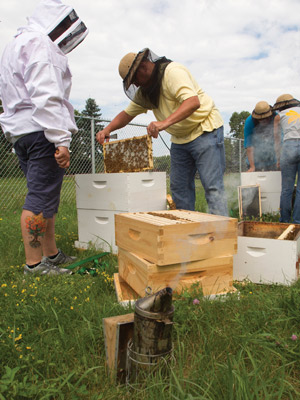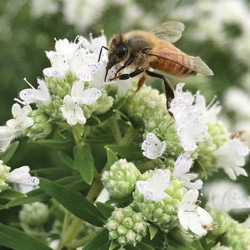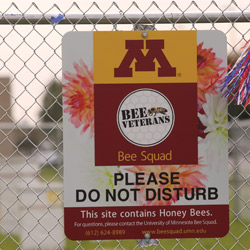Beekeeping brings community and connectedness to those who have served.
As a disabled Navy veteran living in northern Minnesota, Scott Isaacman was looking for ways to get out more often. Following his experience in the military, he says he was becoming a “hermit in the woods.”
Sometime last year, during a visit to his local VA clinic, Isaacman saw a flyer for the Bee Veterans program. A partnership between University of Minnesota Bee Lab’s Bee Squad and the Metropolitan Airports Commission, the program offers free beekeeping workshops for veterans.
Despite his aversion to anything that buzzes, Isaacman decided to give it a try. Every other week this past summer, he drove to the Bee Veterans apiary at Minneapolis-St. Paul International Airport. He joined a group of eight veterans led by Rebecca Masterman, University of Minnesota Extension educator, to learn everything from working the hives to harvesting honey.
“Classes are based on what the bees need at the time,” says Masterman. “We’ve seen great excitement and we’ve trained some amazing beekeepers.”
Isaacman has become one of them. He’s even started supporting native bees on his own land in Lake County near Tettegouche State Park. “The program changed my whole attitude about bees and insects,” he says. “It’s a completely different world, filled with different types of behavior and communication. And it was a non-threatening way to get out of the house and do something with some people.”
Sharing the peace through philanthropy
Bee Veterans was founded in honor of the late veteran and beekeeper Michael Roche, who provided initial funding for the program.
“Mike marveled at the work ethic and unity of the bees and loved caring for them,” says his widow, Diane Roche. “He volunteered to support the program in the hope that other service men and women could experience the same sense of peace and connectedness.”
Bee Veterans offers a shining example of the Bee Squad’s mobilizing power. Extension educators are working together with veterans, scientists, youth, artists and the public to promote the conservation, health and diversity of bee pollinators.
“The Bee Squad has become something bigger than just beekeeping,” says Masterman. “We’re supporting all of the bees out there, and we’re doing it through the power of engaging our community as a whole.”
Join the Bee Squad community
Founded in 2011 by Marla Spivak, Extension entomologist, MacArthur Fellow and Distinguished McKnight Professor, the Bee Squad was designed to guide both the public and beekeepers in their efforts to support the bee population.
Along with Bee Veterans, the Bee Squad offers a variety of ways to get involved:
- Educational beekeeping programs for new and experienced beekeepers
- Bee Arts, for artists exploring themes of pollinators and the environment
- Hive to Bottle, for people who enjoy honeybees and honey but don’t want to manage a colony
- Pollinator Ambassadors, training high school students
Related stories
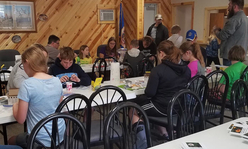
4-H'ers help pollinators
Future engineering gurus plant flowers for pollinators
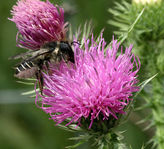
A boost for bees
The Master Gardener program is increasing its efforts to help bees and other pollinators thrive.


